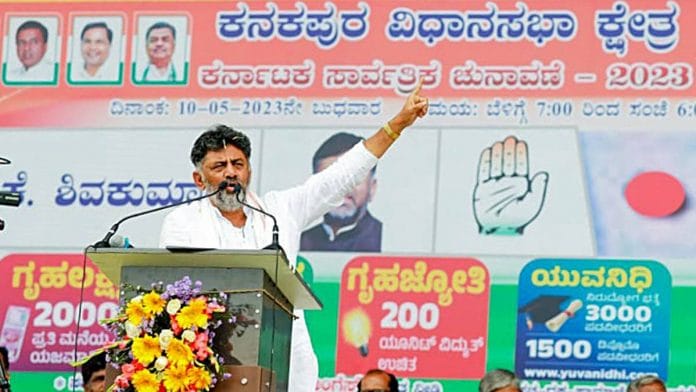New Delhi: The Congress has accused the Election Commission(EC) of violating the Constitution by its “arbitrary” use of power and “lack of action” on the party’s complaints against Prime Minister Narendra Modi and other Bharatiya Janata Party (BJP) leaders, for allegedly flouting the model code of conduct during the Karnataka election campaign.
Karnataka votes for the assembly Wednesday.
In an eight-page letter to the EC Tuesday, the Congress general secretary in-charge for Karnataka, Randeep Singh Surjewala, cited alleged instances where PM Modi, Uttar Pradesh Chief Minister Yogi Adityanath, Union Home Minister Amit Shah and BJP national president J.P. Nadda had “brazenly and blatantly violated” the election code. Surjewala also shared the letter on Twitter.
In his letter to the EC, Surjewala pointed out that the silence period for the polls, during which campaign is not allowed, began at 6 pm Monday. Citing a video posted by the BJP on its official YouTube channel, allegedly after 11 pm Monday, he said: “Yesterday post 11 pm, Shri Narendra Modi addressed the public through a video message, wherein he appealed to the voters of Karnataka on behalf of BJP and all its candidates contesting in the Karnataka Legislative Assembly Elections 2023.”
While the video was uploaded on the BJP YouTube channel handle post-midnight midnight Monday, it was posted on the Prime Minister’s official Twitter account on Tuesday morning, claimed the letter.
Earlier on Monday, the Congress had responded to the EC’s show cause notice to the party’s Karnataka unit president D.K. Shivakumar, for the Congress’s “40% commission sarkara” poll campaign, purportedly targeting the BJP ahead of the assembly elections.
The campaign is believed to be an allusion to the “40% commission” row that erupted in April last year following the death of Belagavi-based contractor Santosh Patil.
In a purported suicide note, Patil had accused former state minister and BJP leader K.S. Eshwarappa of demanding 40 per cent commission for a government project.
In a 15-page response to the EC over the show cause notice, which the Congress also share with the media, the party’s member of Parliament, Abhishek Manu Singhvi, cited 11 alleged instances of “egregious violation” of the model code of conduct by the BJP, including three alleged violations by the Prime Minister.
Singhvi added that it was “unreasonable” for the EC to expect a reply to their show cause within 24 hours, when D.K. Shivakumar and other leaders of the party were busy with poll campaigning.
He alleged that the EC takes such prompt action only in the case of the Opposition.
‘Ignore heinous and shocking instances of hate speech’
In his response to the EC’s show cause notice, Singhvi said, “The ECI can never allow itself to be seen as an organisation that on the one hand turns a Nelsonian blind eye to egregious violations by the ruling party and its high post holders, and on the other, is seen as unfortunately tilting at windmills as far as the members in the opposition space are concerned, including the INC,” he said.
Singhvi alleged that the ECI was violating Articles 14 (equality before law and equal protection of the law) and 21 (protection of life and personal liberty) of the Constitution by its “arbitrariness in administrative action”.
“Narendra Modi, in his campaign speeches, has made widespread and outrightly false remarks against the INC for supporting terrorists, leveling a completely false allegation of 85% commission against the INC, and siphoning money for development…” Singhvi claimed in his response to the EC.
The Congress has also alleged that BJP members had accused the opposition party of supporting the Popular Front of India (PFI), a banned terrorist outfit, and threatened the state with communal riots.
It claimed that the allegations are “not only false but extremely dangerous, clearly designed to polarise the vote base and inflame passions to an obvious end”.
The party added: “If ECI chooses to ignore heinous and shocking instances of hate speech, direct and unconcealed religious invocations to seek votes… deliberately designed to prejudice the peaceful and fair conduct of elections, then it cannot adopt a different standard in a case where a genuine concern has been voiced by another party.”
(Edited by Anumeha Saxena)






